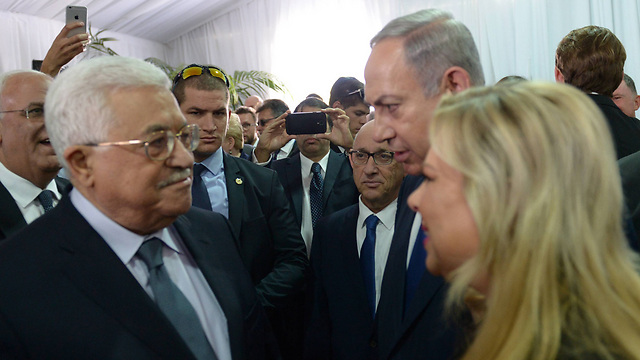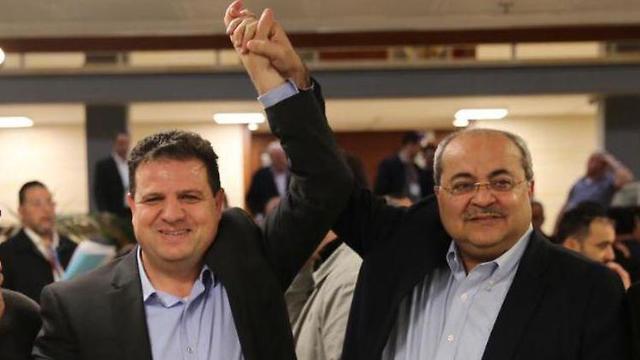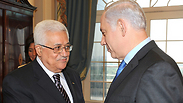
Palestinians have low expectations of Israeli elections
Poll shows two thirds of Palestinians believe election results will have no or a negative impact for them and express concern about the outcome, which they say will have a direct and major effect on their daily lives and future aspirations for statehood
Honaida Ghanim, general director of The Palestinian Forum for Israeli Studies (MADAR), believes that “Palestinians are following with great concern the election because many decisions concerning… the future of the dream of a Palestinian state will be taken in this election.
"There is a real fear," she tells The Media Line, "that this government, especially under (Prime Minister Benjamin) Netanyahu’s leadership, is ready to go to the extreme in order to remain in power.”

With the peace process frozen, and Netanyahu making a campaign promise to annex the West Bank’s Jordan Valley, many Palestinians have little hope the election’s outcome will improve their predicament.
Esmat Mansour, a Palestinian writer specializing in Israeli affairs, says that only a defeat for Netanyahu can change things.
“If Netanyahu goes away, it will have a direct impact on the region and the Palestinian issue in particular, not a radical one, but at least it will change the course and way of dealing,” he says.
Palestinian journalist Waleed Omri says that whoever wins the election, it will have major consequences for the region.
“The Israeli election may have very serious repercussions, especially if right-wing forces in Israel dominate and try to overlook the Palestinian issue and a peaceful resolution.”
Palestinians want to establish their own state in territories captured by Israel in the 1967 Six-Day War, with East Jerusalem as its capital.
But many say that Israeli politicians on both the left and right, as well as the Israeli public, don’t seem to have the issue on their agenda.
That fact, Omri says, “has forced the Palestinian Authority to look for ways to influence Israeli society and the election.”
He notes that Palestinian President Mahmoud Abbas has created a “Committee to Communicate with Israeli Society.”
Despite some Palestinians disapproving of the effort, calling it a step toward normalization, the committee has brought current and former Israeli politicians, academics and activists to meet with Abbas in Ramallah.
Concurrently, Palestinian officials have held meetings with Israeli citizens of different backgrounds in an attempt to change their perceptions of the Palestinians, and thus influence the election.
“It’s an important committee, but it needs to be retooled to redefine its role,"Mansour says.
"It’s difficult to influence the Israeli public this way. Its influence will not be felt immediately, but these bridges are beneficial.”
MADAR’s Ghanim disagrees, saying she sees “no reason for it to exist. I think the chances of it influencing the election are less than zero. The chances are non-existent for a very simple reason, namely that Israeli society is moving to the right.”
Ghanim believes only the Arab political parties in Israel are offering a real agenda.
“In practice, the Arab lists are the only ones presenting a program to end the occupation, dismantle settlements and stop Israeli arrogance. They are the only ones that present a clear and ethical political agenda,” she says.

A recent poll by the Jerusalem Media and Communication Center found that more than 40 percent of Palestinians believe the Israeli election will have a negative impact, with another 25 percent saying it would have no impact at all.
The poll surveyed 1,200 people in the West Bank and Gaza Strip and had a margin of error of plus or minus 3 percentage points.
To Hamza Khalaf, who owns a vegetable stall in a Ramallah produce market, it doesn’t matter who comes out on top.
“I honestly don’t care. They are all the same. All they care about is winning and advancing the Israeli Jewish agenda,” he says.
Khalaf added that most Palestinians feel that U.S. President Donald Trump’s strong support of Israel makes it almost impossible for peace negotiations to gain any traction.
“Israeli society has shifted to the right since Netanyahu took office years ago, and all Israelis, left and right, are happy with the status quo. So what can change?”
Article written by Mohammad al-Kassim. Reprinted with permission from The Media Line
















